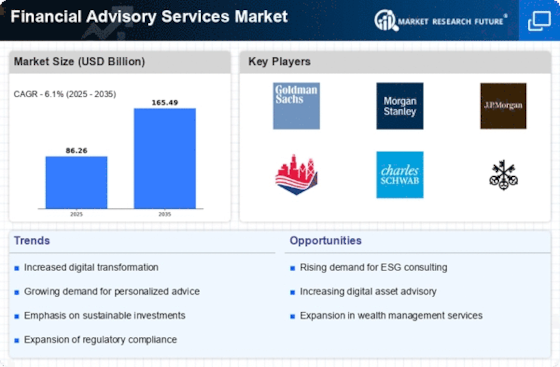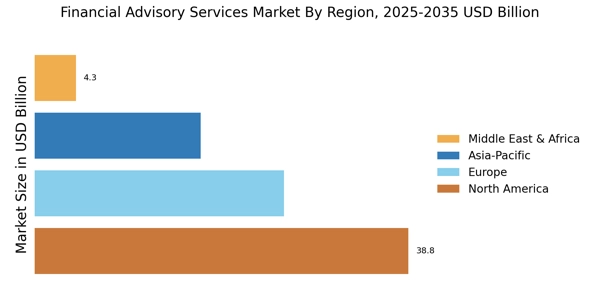Increasing Wealth Accumulation
The Financial Advisory Services Market is experiencing a notable surge in demand due to the increasing wealth accumulation among individuals and families. As disposable incomes rise, more clients seek professional guidance to manage their assets effectively. According to recent data, the number of high-net-worth individuals is projected to grow significantly, leading to a greater need for tailored financial strategies. This trend indicates that financial advisors must adapt their services to cater to a more affluent clientele, focusing on wealth preservation and growth. Furthermore, the rise in personal investments in various asset classes, including real estate and equities, underscores the necessity for expert advice in navigating complex financial landscapes. As a result, the Financial Advisory Services Market is likely to expand, driven by the growing sophistication of clients and their financial needs.
Regulatory Changes and Compliance
The Financial Advisory Services Market is influenced by ongoing regulatory changes that necessitate compliance from financial advisors. Governments and regulatory bodies are increasingly implementing stringent guidelines to protect consumers and ensure transparency in financial transactions. This evolving regulatory landscape compels financial advisors to stay informed and adapt their practices accordingly. For instance, the introduction of fiduciary standards requires advisors to act in the best interest of their clients, which may lead to a shift in service offerings. Additionally, compliance with anti-money laundering regulations and data protection laws is becoming paramount. As a result, financial advisory firms are investing in compliance training and technology to meet these requirements. This focus on regulatory adherence not only enhances the credibility of the Financial Advisory Services Market but also fosters trust among clients, ultimately driving growth in the sector.
Growing Demand for Retirement Planning
The Financial Advisory Services Market is experiencing heightened demand for retirement planning services as individuals become more aware of the need for financial security in their later years. With increasing life expectancy, clients are seeking comprehensive strategies to ensure they have sufficient resources to maintain their desired lifestyle during retirement. Recent studies indicate that a significant portion of the population is underprepared for retirement, creating an opportunity for financial advisors to offer tailored solutions. This includes investment strategies, tax planning, and estate planning services that align with clients' long-term goals. As a result, financial advisory firms are likely to expand their offerings to address this growing need, thereby driving growth within the Financial Advisory Services Market. The emphasis on retirement planning not only benefits clients but also enhances the reputation of advisors as trusted partners in achieving financial well-being.
Increased Focus on Sustainable Investing
The Financial Advisory Services Market is witnessing a shift towards sustainable investing, reflecting a growing awareness of environmental, social, and governance (ESG) factors among investors. Clients are increasingly seeking investment opportunities that align with their values, prompting financial advisors to incorporate ESG criteria into their recommendations. This trend is supported by data indicating that sustainable investments have outperformed traditional investments in recent years, attracting a diverse range of investors. As a result, financial advisory firms are adapting their strategies to include sustainable investment options, thereby appealing to a broader clientele. This focus on sustainability not only addresses the ethical considerations of clients but also positions the Financial Advisory Services Market as a leader in promoting responsible investing practices. Consequently, the integration of sustainable investing into advisory services is likely to drive growth and innovation within the sector.
Technological Advancements in Financial Services
The Financial Advisory Services Market is witnessing a transformative phase due to rapid technological advancements. Innovations such as artificial intelligence, machine learning, and blockchain are reshaping how financial advisors operate and interact with clients. These technologies enable advisors to analyze vast amounts of data, providing personalized insights and recommendations. For example, robo-advisors are gaining traction, offering automated investment solutions that appeal to tech-savvy clients. Moreover, the integration of customer relationship management (CRM) systems allows for enhanced client engagement and streamlined operations. As technology continues to evolve, financial advisory firms are likely to adopt these tools to improve efficiency and service delivery. This trend not only enhances the client experience but also positions the Financial Advisory Services Market for sustained growth in an increasingly digital world.

















